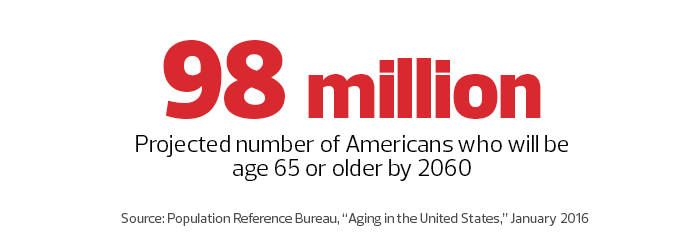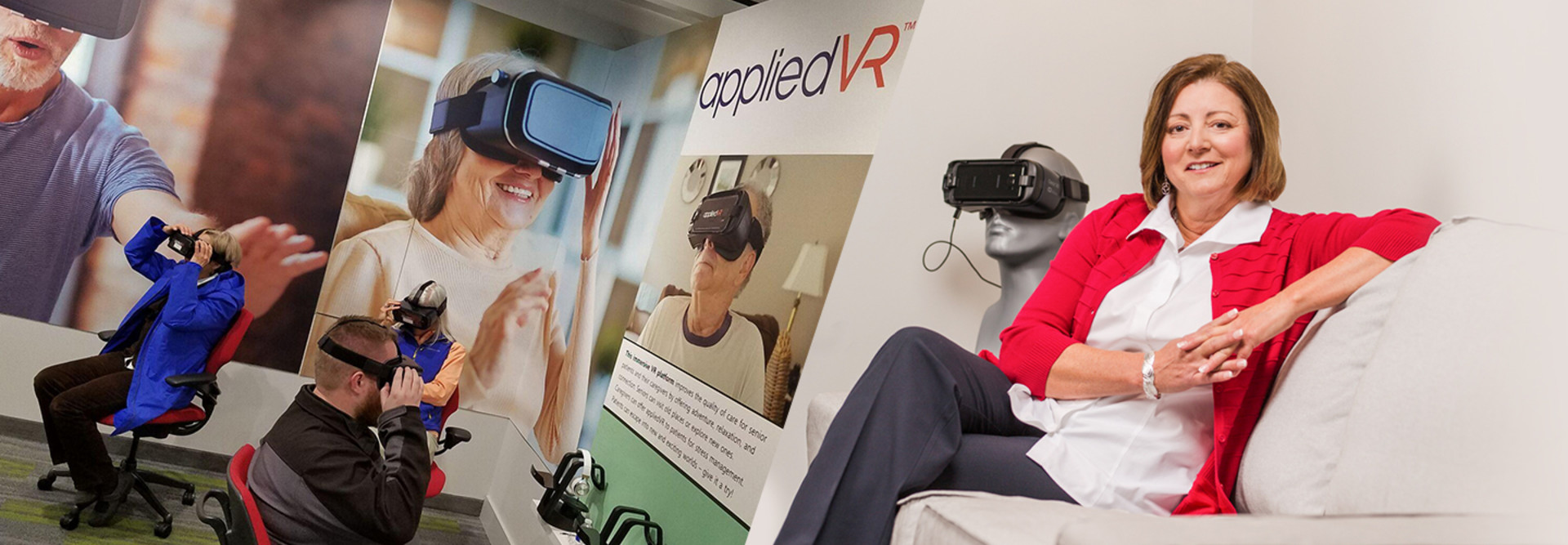The Thrive Center Unlocks an Innovation Hub for Senior Living
Technology’s role in senior care has long been tough to define. While innovative tools such as wearables and virtual reality headsets hold promise for helping aging Americans live fuller, safer and healthier lives, such devices can sometimes seem less user-friendly for older individuals, leaving senior care organizations with uncertainty about their technology strategies.
The Thrive Center aims to provide clarity to seniors and the industry.
The Louisville, Ky.-based nonprofit center, which opened in November 2017, is a 7,400-square-foot space that showcases cutting-edge technology and provides education aimed at improving the quality of life and care for the elderly.
The facility features interactive technology exhibits, event spaces and conference rooms and is a place for tech companies, senior care providers, academic researchers and the public to collaborate and learn from each other, says Sheri Rose, the center’s CEO and executive director.
“We want to be a hub of innovation focused on aging care and bring in senior care providers who are looking to adopt the technology, but also seniors who are ultimately impacted by the technology innovation,” she says.
Established tech companies and startups, for example, can show their wares and receive feedback from seniors and interact with healthcare providers in search of innovative solutions. What’s more, seniors can discover technology that will let them live independently, such as smart home sensors that allow family to track and monitor them remotely.
Assisted-living facilities can also learn about technology that helps residents flourish in their environment, such as customized tablets, music therapy or special headphones designed to both improve hearing and allow seniors to participate in group activities.
In the future, organizers want to hold lectures on the latest research on aging and provide educational classes for seniors and their families, from how to create quick, healthy meals to strategies on how family caregivers can cope with dementia and other age-related issues.
“The potential for the Thrive Center is unlimited,” says Joseph Steier, President and CEO of Signature HealthCARE, a Louisville-based healthcare and rehabilitation company with 125 locations in 11 states.
SIGN UP: Get more news from the HealthTech newsletter in your inbox every two weeks!
A Peek at State-of-the-Art Technology
The Thrive Center is funded by more than $2 million, including grants awarded by both local and state government organizations as well as in-kind donations from technology companies and Louisville-based senior and home care companies such as Signature HealthCARE, Delta Dental, Kindred Healthcare, Hosparus Health, PharMerica and others.
From Samsung digital displays and a video wall that shows educational content to tablets, VR headsets and wearables that provide visitors with hands-on experiences, Thrive teems with state-of-the-art technology.

Engineers from CDW Healthcare, the center’s official technology sponsor, consulted on the architecture and the installation of the technology and IT infrastructure, including CAT 6 cabling and HPE Aruba Wi-Fi access points. CDW Healthcare also was instrumental in the installation and configuration of a Lenovo server that runs the center’s business applications and a few exhibits. Intel Unite OS-agnostic presentation software allows the Thrive Center to hold videoconferences, and also enables visitors to display presentations during scheduled events.
CDW Healthcare also helped recruit many tech vendors to take part in the project. Samsung, HPE Aruba, Intel and Lenovo all donated technology; Lenovo also provided desktops and notebooks to the staff. Humanscale equipped the center with desks and chairs, and Ergotron donated display mounts and tablet charging carts.
As visitors immerse themselves in the technologies at the center, they also learn about the importance of IT infrastructure required to power those technologies, Rose says.
“In the back of the Thrive Center, we tell the story of the importance of infrastructure,” says Rose. “If you are building a senior care facility, you need a proper foundation in place — internet access and Wi-Fi capability — so these innovative technologies and smart applications can work. Our data room is called the CDW Technology Enrichment Center, known as the brains of the facility.”
Historically, senior care organizations have been reluctant to invest in technology; their support and donations for the Thrive Center show recognition of the need to provide residents with more tech-enabled environments, says Laurie Orlov, principal analyst of Aging in Place Technology Watch. “There is big pressure for senior living communities to put technology in,” Orlov says. “They need to provide Wi-Fi because people will move in with devices and they’ll want to have access.”
Tech Maximizes Memory Care at the Thrive Center
The Thrive Center showcases more than a dozen interactive experiences, and will focus on different aging themes every eight to 12 months. Because the number of Americans with Alzheimer’s disease is expected to nearly triple by 2050, from about five million individuals today to 14 million, the center chose to put its initial focus on memory care and dementia.
“We challenged the tech companies to come up with use cases for their technology that applied to memory,” Rose says. Some technologies focus on the safety of residents, while others focus on helping the elderly stay more active and engaged, which can improve their overall well-being.
For example, tech startup Piper touts wearables and beacons that family members and senior living facilities can use to track the location of seniors to make sure they don’t wander out of their home or living facility.
A Samsung Smart Home features smart appliances and sensors that show if windows and doors are open, how often seniors open their refrigerator and pantry (to make sure they are eating) and how often they use the bathroom (to make sure they are not dehydrated).
“Adult children can log on to a smartphone app and monitor their parents, so they can see their parents’ movements and make sure they didn’t leave the oven on or a window open,” Rose says. Breezie tablets offer an easy-to-use, senior-friendly interface that helps older adults stay connected to their families, and also provides entertainment.
“These technologies are not only engaging, but can also be therapeutic for seniors,” Rose says.
Visitors to the Thrive Center can also test VR headsets. The technology can assist vision-impaired elderly, such as those with macular degeneration, to magnify, zoom in and see the world around them. VR can also be used to manage pain and anxiety levels for seniors with dementia by having them experience a calming beach scene.
SingFit allows individuals suffering from dementia to sing along with old songs while exercising the mind and body. “The music can stimulate the neurons in their brains as they sing and increase oxygen levels through body movement,” Rose says. “It impacts their mood and allows them to go back in time and say, ‘I remember when that song came out and where I was.’”
The Thrive Center Keeps Pace with Innovation
Ginna Baik, senior care practice leader for CDW Healthcare, is optimistic that the Thrive Center will make good on its promise to innovate and transform the quality of life and care for seniors because of its many programs in the works.
In addition to educational programs, the center plans to hold executive leadership forums, so senior care provider executives can discuss solutions they need; the center then can bring in tech companies to help resolve those issues.

The Thrive Center also plans to hold consumer advisory panels so seniors can test products under development. Researchers will be able to observe those tests and measure effectiveness.
“We want to talk about what a 21st-century senior care community looks like and drive thought leadership, and this is a place where we can have that conversation,” Baik says.
Steier, who also serves on the Thrive Center’s board of directors, agrees that collaboration is a huge benefit. The ability for senior care providers to not only work with each other and with tech companies, but also get feedback from consumers, will take the guesswork out of innovation, he says.
“All the companies feel this can be a game changer,” Steier says. By investing in the right technologies, Signature HealthCARE hopes to improve customer satisfaction by 5 to 10 percent in the coming years, Steier says.
Rose and the rest of the Thrive Center’s board of directors are already discussing other topics the center will focus on in the future. Chronic disease, isolation, depression and the importance of socialization, as well as advanced end-of-life care represent a few possibilities, she says.
As the themes change, the technology showcased will change, Rose says.
“It’s like a museum. We have to stay relevant,” she says. “One day, I want someone to say, ‘I’ve been to the Thrive Center,’ and I’ll say, ‘You saw it when it was about memory. Have you seen it now with the latest theme and new technology.'"









